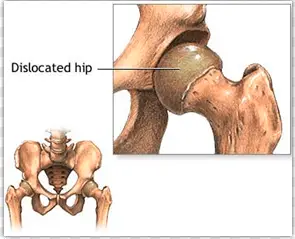Signs and Symptoms of Dislocated Hip
Among the most common dislocated hip symptoms is the chronic pain in the hip and groin. Individuals who take anti-inflammatory drugs eventually notice the discomfort to subside. As a result, they infer that seeking further treatment including undergoing hemiarthroplasty, hip resurfacing, and total hip replacement surgery is unnecessary. However, should they refuse to let it heal properly, their dislocated hip might cause serious complications.
Here are 5 worst conditions that can be acquired with a dislocated hip:
Contents
Avascular Necrosis
Groin pain after hip replacement surgery may be experienced but the severity won’t compare to the pain brought by avascular necrosis, which can occur if appropriate hip dislocation treatment is delayed. Also called bone infarction, aseptic necrosis, and osteonecrosis, it is a disease caused by the interruption of the blood supply.
When the hip gets dislocated after a major fall or a car accident, immediate attention must be sought as it could lead to avascular necrosis. With the condition, individuals will be suffering from bouts of numbness in the hip, leg, and thigh areas.
Asymmetrical legs
Asymmetrical legs are a concern of individuals not getting proper treatment for a dislocated hip. Displacement of the body part may cause varying levels of discomfort in the groin, hip pain, and even swelling in the thighs.
Other than that, with asymmetrical legs, the balance will be affected. Consequently, doing simple activities such as going around the house and lifting heavy objects may be challenging. Individuals with the condition are stuck walking with a limp.
Bursitis (Hip)
Bursitis is an aftermath of a dislocated hip. It is characterized by the inflammation in the areas around the hip, groin pain, and tenderness in the upper buttocks. With the condition, the two main gliding surfaces of the hip, the ischial and the trochanteric, are damaged. As a result, making the slightest movement involving hip joints can be painful.
According to orthopedic surgeons, though bursitis may simply be treated with analgesics, antibiotics, and anti-inflammatory drugs, it could still exacerbate and lead to a chronic ailment. As a proposal, getting immediate medical help for the hip dislocation is recommended.
Femoral Bone Dysfunction
Femoral bone dysfunction is another condition that could be acquired. As they are afraid of the discomfort, extreme swelling, and groin and hip pain, there are individuals aware of the consequences of not getting proper treatment for hip dislocation but opt to prolong their situation.
However, in exchange for femoral bone dysfunction’s effects including bouts of buckling sensations, limited overall movement, and weakness in the hip and the leg area, is getting a total hip replacement surgery worth dismissing? They should be reminded that the groin pain after hip replacement surgery is nothing compared to the physical as well as the emotional difficulty that may come to the realization that the quality of life will be affected.
Osteoarthritis
Due to a dislocated hip, individuals may be in for frequent episodes of tenderness, swelling of the hip, and groin pain brought about by the most common form of arthritis – osteoarthritis. Those with the problem shouldn’t hesitate to let an orthopedic surgeon remedy their cases.
As osteoarthritis is a degenerative bone condition, individuals with it are looking at a total loss of muscle function in the hip and legs. When they were first made aware of their situation and they simply ignored the issue of seeking further treatment, their ability to move freely may not have been a concern. Years ahead, however, when they may no longer be as physically active, they’ll be full of regrets.
These are the 5 Worst Conditions that Can Be Acquired if Not Treated Properly
Signs and symptoms of dislocated hip, Last Update:23/4/2017


